Here are some events that happened on January 27th. It could be an event or a person that died or was born on that day
1596 Died: Francis Drake, English captain and explorer (b. 1540)
Sir Francis Drake (c. 1540 – 28 January 1596) was an English sea captain, privateer, slave trader, pirate, naval officer and explorer of the Elizabethan era. Drake carried out the second circumnavigation of the world in a single expedition, from 1577 to 1580, and was the first to complete the voyage as captain while leading the expedition throughout the entire circumnavigation. With his incursion into the Pacific Ocean, he claimed what is now California for the English and inaugurated an era of conflict with the Spanish on the western coast of the Americas, an area that had previously been largely unexplored by western shipping.
Elizabeth I awarded Drake a knighthood in 1581 which he received on the Golden Hind in Deptford. In the same year he was appointed mayor of Plymouth. As a Vice Admiral, he was second-in-command of the English fleet in the victorious battle against the Spanish Armada in 1588. He died of dysentery in January 1596, after unsuccessfully attacking San Juan, Puerto Rico.
Drake's exploits made him a hero to the English, but his privateering led the Spanish to brand him a pirate, known to them as El Draque. King Philip II allegedly offered a reward for his capture or death of 20,000 ducats, about £6 million (US$8 million) in modern currency.
Stamps from Great Britain depicting Francis Drake
1756 Born: Wolfgang Amadeus Mozart, Austrian pianist and composer (d. 1791)
Wolfgang Amadeus Mozart (27 January 1756 – 5 December 1791), baptized as Johannes Chrysostomus Wolfgangus Theophilus Mozart, was a prolific and influential composer of the classical era.
Born in Salzburg, Mozart showed prodigious ability from his earliest childhood. Already competent on keyboard and violin, he composed from the age of five and performed before European royalty. At 17, Mozart was engaged as a musician at the Salzburg court but grew restless and traveled in search of a better position. While visiting Vienna in 1781, he was dismissed from his Salzburg position. He chose to stay in the capital, where he achieved fame but little financial security. During his final years in Vienna, he composed many of his best-known symphonies, concertos, and operas, and portions of the Requiem, which was largely unfinished at the time of his early death at the age of 35. The circumstances of his death have been much mythologized.
He composed more than 600 works, many of which are acknowledged as pinnacles of symphonic, concertante, chamber, operatic, and choral music. He is among the most enduringly popular of classical composers, and his influence is profound on subsequent Western art music. Ludwig van Beethoven composed his early works in the shadow of Mozart, and Joseph Haydn wrote: "posterity will not see such a talent again in 100 years".
Some stamps from various countries commemorating Mozart
1832 Born: Lewis Carroll, English novelist, poet, and mathematician (d. 1898)
Charles Lutwidge Dodgson (27 January, 1832 – 14 January, 1898), better known by his pen name Lewis Carroll, was an English writer of children's fiction, notably Alice's Adventures in Wonderland and its sequel Through the Looking-Glass. He was noted for his facility at word play, logic, and fantasy. The poems Jabberwocky and The Hunting of the Snark are classified in the genre of literary nonsense. He was also a mathematician, photographer, inventor and Anglican deacon.
Carroll came from a family of high-church Anglicans, and developed a long relationship with Christ Church, Oxford, where he lived for most of his life as a scholar and teacher. Alice Liddell, daughter of the Dean of Christ Church, Henry Liddell, is widely identified as the original for Alice in Wonderland, though Carroll always denied this. Scholars are divided about whether his relationship with children included an erotic component.
In 1982, a memorial stone to Carroll was unveiled in Poets' Corner, Westminster Abbey. There are Lewis Carroll societies in many parts of the world dedicated to the enjoyment and promotion of his works.
Stamps from Great Britain depicting Alice in Wonderland characters
1859 Born: Wilhelm II, German Emperor (d. 1941)
Wilhelm II or William II (German: Friedrich Wilhelm Viktor Albert; 27 January 1859 – 4 June 1941) was the last German Emperor (Kaiser) and King of Prussia. He reigned from 15 June 1888 until his abdication on 9 November 1918 shortly before Germany's defeat in World War I.
The eldest grandchild of Queen Victoria, Wilhelm's first cousins included King George V of the United Kingdom and many princesses who, along with Wilhelm's sister Sophia, became European consorts. For most of his life before becoming emperor, he was second in line to succeed his grandfather Wilhelm I on the German and Prussian thrones after his father, Crown Prince Frederick. His grandfather and father both died in 1888, the Year of Three Emperors, making Wilhelm emperor and king. He dismissed the country's longtime chancellor, Otto von Bismarck, in 1890.
Upon consolidating power as emperor, Wilhelm launched Germany on a bellicose "New Course" to cement its status as a respected world power. However, he frequently undermined this aim by making tactless, alarming public statements without consulting his ministers. He also did much to alienate his country from the other Great Powers by initiating a massive build-up of the German Navy, challenging French control over Morocco, and backing the Austrian annexation of Bosnia in 1908. His turbulent reign ultimately culminated in his guarantee of military support to Austria-Hungary during the crisis of July 1914, resulting in the outbreak of World War I. A lax wartime leader, he left virtually all decision-making regarding military strategy and organisation of the war effort in the hands of the German General Staff. This broad delegation of authority gave rise to a de facto military dictatorship whose belligerent foreign policy led to the United States' entry into the war on April 6, 1917. After losing the support of the German military and his subjects in November 1918, Wilhelm abdicated and fled to exile in the Netherlands, where he died in 1941.
Stamp issued by Germany depicting Wilhelm II
Postcard depicting Wilhelm II
1880 – Thomas Edison receives a patent for his incandescent lamp.
Edison was raised in the American Midwest; early in his career he worked as a telegraph operator, which inspired some of his earliest inventions. In 1876, he established his first laboratory facility in Menlo Park, New Jersey, where many of his early inventions were developed. He later established a botanic laboratory in Fort Myers, Florida in collaboration with businessmen Henry Ford and Harvey S. Firestone, and a laboratory in West Orange, New Jersey that featured the world's first film studio, the Black Maria. He was a prolific inventor, holding 1,093 US patents in his name, as well as patents in other countries. Edison married twice and fathered six children. He died in 1931 of complications of diabetes.
US and Hungarian stamp featuring Edison and or his inventions


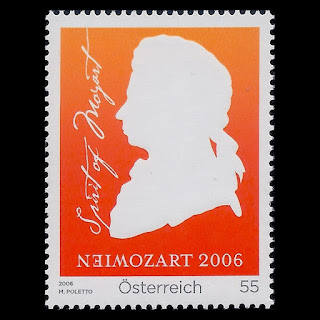

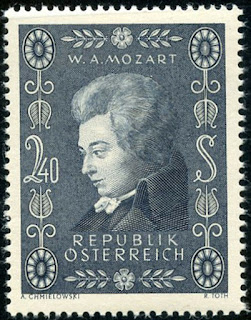



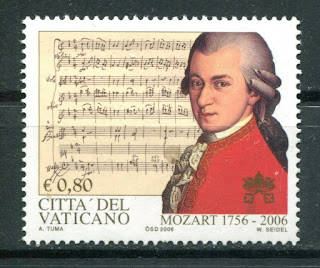


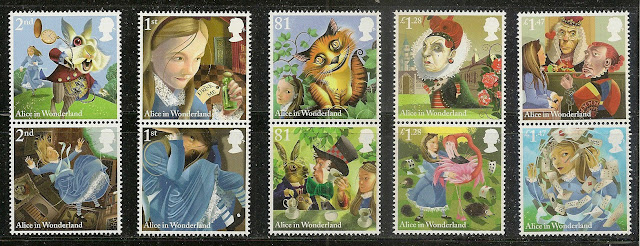
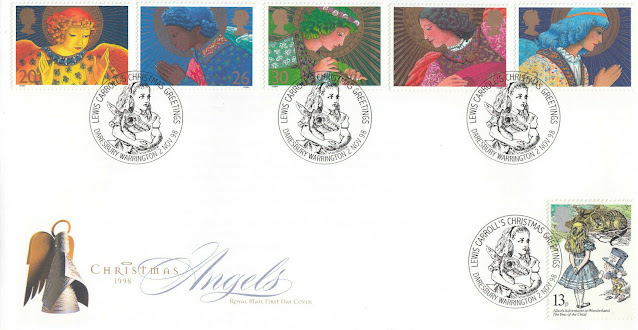




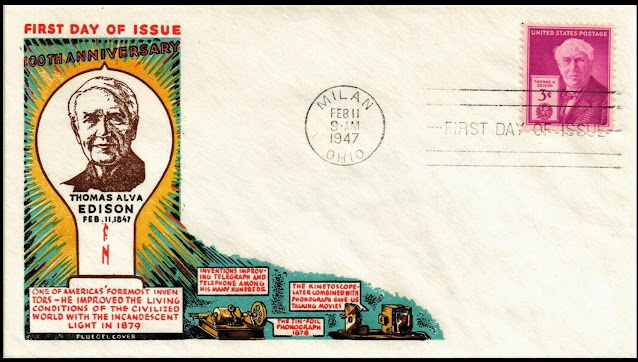

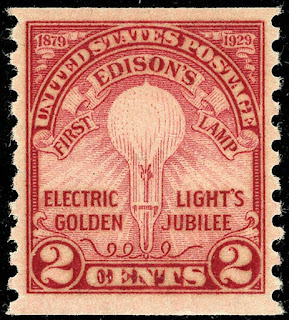

No comments:
Post a Comment